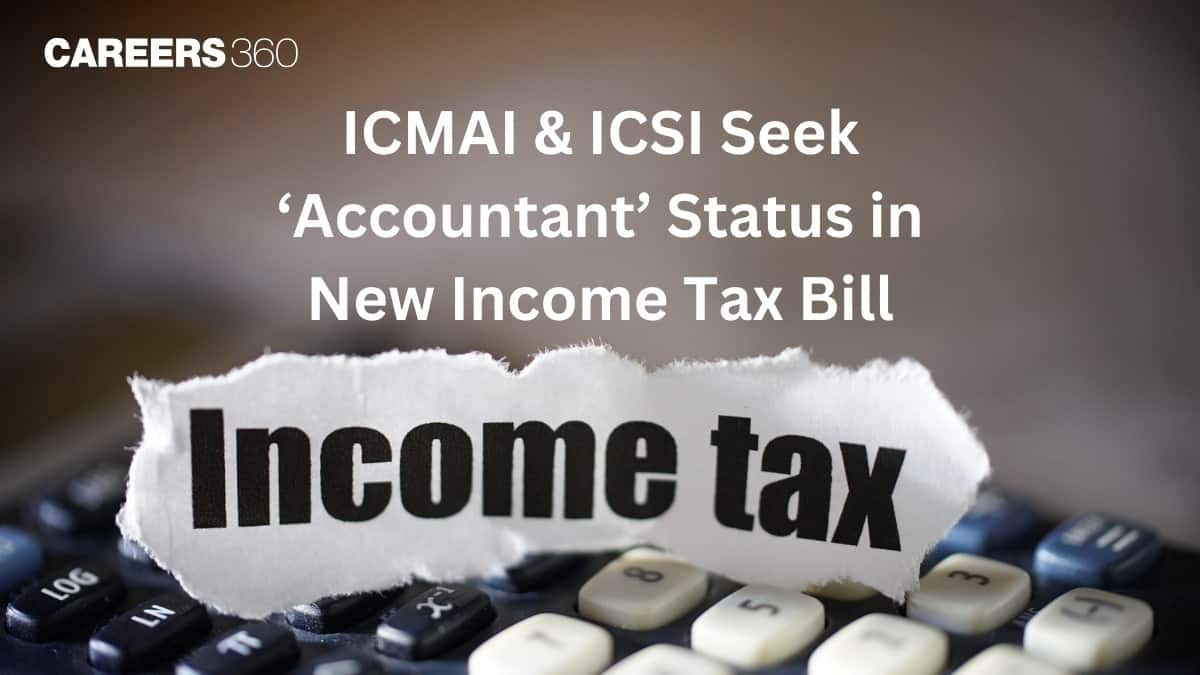Chandigarh University Admissions 2026
NAAC A+ Accredited | Among top 2% Universities Globally (QS World University Rankings 2026)
The New Income Tax Bill 2025 was tabled in the parliament by Finance Minister, Nirmala Sitharaman on February 13, 2025. The Institute of Cost Accountants of India (ICAI) and the Institute of Chartered Secretaries of India (ICSI) have expressed strong disappointment with the non-inclusion of the profession of “Accountant” in the new IT bill.

The apex bodies of CMAs and CSs demand inclusion in the definition of the term “Accountant” in Section 515(3)(b) of the newly introduced bill. Both ICMAI and ICSI have registered their dissent with the new IT bill to the Finance Ministry. ICMAI comprises around 1 lakh members while ICSI has around 75,000 active members.
The official X (formerly Twitter) handle of ICMAI shared a message from CMA Bibhuti Bhushan Nayak, President, ICMAI regarding the recent events that unfolded. In his message, Nayak said, “The Council of the Institute is fully seized with the issue of non-inclusion of 'Cost Accountant' in the definition of Accountant in the newly introduced Income Tax Bill, 2025. This is contrary to the assurance given to us that a level playing field will be provided to all professionals. Your Council is in touch with policy makers and a road map will be shared with you for your valuable input. This is the time when we should exhibit our professional competence. I assure you that we will not leave any stone unturned to represent our profession strongly and push for our legitimate position in the statute.”
NAAC A+ Accredited | Among top 2% Universities Globally (QS World University Rankings 2026)
UGC recognised University | NAAC 'A' Grade | Merit & need-based scholarships available | Applications Closing Soon!
Amid the huge uproar on social media and CS community overall, ICSI has also written to Finance Minister Nirmala Sitharaman requesting for inclusion of Company Secretaries in the definition of “Accountant” in the IT bill.
In a letter written to the Ministry of Finance and Ministry of Corporate Affairs, the newly elected President of ICSI, CS Dhananjay Shukla writes, “In view of the various recognitions available to Company Secretaries and the detailed coverage of the Accounting and Taxation papers in the curriculum of Company Secretaryship Course, it is submitted that Company Secretaries are very well conversant with the technicalities of the accountancy and taxation and are at par with other professionals.
In light of the above, we request your goodself to include the profession of 'Company Secretary' within the meaning of the Company Secretaries Act, 1980 in the Definition of "Accountant" given under Section 515(3)(b) of The Income-Tax Bill, 2025…”
While CMAs and CS professionals have voiced their resentment towards non-inclusion in the Income Tax Bill, there are other contrary views from Chartered Accountants. Many members of the ICAI expressed that “tax audit” is the expertise of Chartered Accountants solely and CMAs and CSs should focus solely on “cost audit” and “secretarial audit”. However, neither the Ministry of Finance nor the Finance Minister has addressed this matter.
As of now, the authority to conduct tax audits under Section 515(3)(b) of the New Income Tax Act is solely given to Chartered Accountants. However, inclusion under the term “Accountant” in the IT bill will allow CMAs and ICSI members also to conduct audits. Both members of ICMAI and ICSI argue that their inclusion in the term “Accountant” will be beneficial for the tax audit given their good understanding of cost analysis, inventory valuation, financial management, compliance, governance, and legal reporting.
Among top 100 Universities Globally in the Times Higher Education (THE) Interdisciplinary Science Rankings 2026
Asia’s only university to be awarded the highest accreditation by WASC, USA and by the Quality Assurance Agency for Higher Education (QAA), UK
NAAC A++ Accredited | Ranked #11 by NIRF
100% Placements Assistance | 1200+ Recruiters
High-quality global education at an affordable cost. International exchange programs & collaborations
Awarded as the most Promising brand | Meritorious Scholarship available